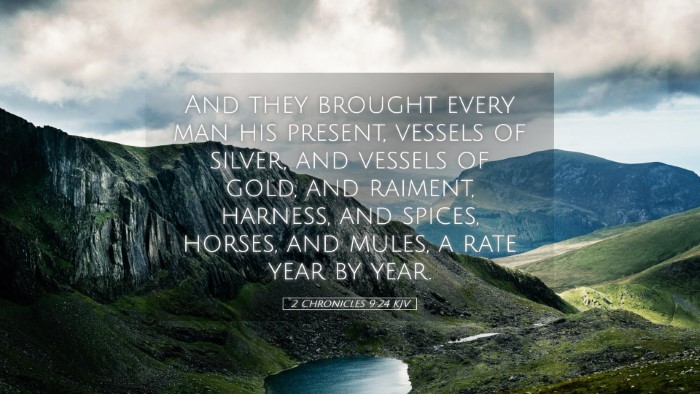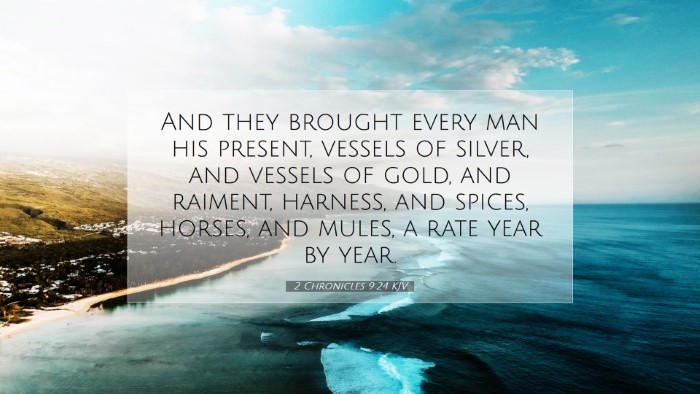Commentary on 2 Chronicles 9:24
Verse Reference: 2 Chronicles 9:24: "And they brought every man his gift, vessels of silver, and vessels of gold, and garments, and armor, and spices, horses, and mules, a rate year by year."
This verse forms part of the account that details the magnificence of Solomon's reign and specifically the tribute brought to him by the surrounding nations, indicating his authority and the wealth of his kingdom.
General Context
The narrative in 2 Chronicles serves to highlight the splendor of Solomon, particularly in relation to the temple he built and the wisdom God granted him. The visit of the Queen of Sheba, prior to this verse, acts as a backdrop against which the wealth and wisdom of Solomon are displayed. It reveals not only his riches but also the respect he garnered among foreign dignitaries.
Insights from Public Domain Commentaries
Matthew Henry's Commentary
Henry observes that this verse illustrates the tribute paid by the nations to Solomon. It reflects a significant acknowledgment of Solomon’s power:
- Divine Authority: The gifts brought to Solomon signify their recognition of God’s sovereignty over him. His position as king was not only political but also spiritual, legitimized by divine favor.
- Symbol of Wealth: The varied gifts—silver, gold, garments, armor, and spices—indicate the wealth present in his kingdom and the prosperity under his rule. This abundance serves a dual purpose: it enriches Israel and serves as a testament to God’s blessings.
- Yearly Tribute: The reference to a "rate year by year" suggests a sustained recognition of Solomon’s reign. This consistency implies that Solomon maintained a steady influence among the nations, further establishing his authority.
Albert Barnes' Notes on the Bible
Barnes elaborates on the significance of tribute in ancient cultures, shedding light on the relationships forged through these exchanges:
- Importance of Tribute: In the ancient Near Eastern context, tribute was a common practice among kingdoms. To bring gifts was not merely an act of generosity but one of political savvy, reinforcing alliances and acknowledging superiority.
- Physical Wealth as Spiritual Blessing: Barnes notes that the material wealth bestowed on Solomon can be viewed symbolically. It reflects the spiritual richness accompanying obedience to God’s commands, attesting to the covenant relationship between God and Israel.
Adam Clarke's Commentary
Clarke provides additional depth regarding the types of gifts and their meanings:
- Diversity of Gifts: The varied nature of the gifts—from horses and mules for military prowess to spices and garments for the luxury of the court—displays the comprehensive wealth of Solomon’s kingdom.
- Horses and Mules: Notably, the mention of horses and mules relates to military might and the capability of defense; Clarke highlights the idea that such gifts indicated a recognition of Solomon's power to protect and govern.
Theological Significance
This passage, therefore, serves multiple theological purposes:
- Affirmation of Divine Kingship: Solomon's reign and the tribute he receives point to God's ultimate authority. Each gift symbolizes acknowledgment of God’s placement of Solomon on the throne.
- Invitation for Participation in God's Blessing: The gifts reflect a broader theological truth in which all nations are invited to partake in the blessing of God's people, reminiscent of the great commission that extends beyond Israel.
- Example of God’s Fidelity: The sustained tribute speaks to God’s faithfulness to His covenant. As the people of Israel remain obedient, they thrive, reminding readers of the blessings of obedience.
Application for Today
This verse conveys timeless truths relevant for contemporary readers:
- Recognition of God’s Sovereignty: Believers today are called to recognize and honor God as the ultimate authority in their lives, as foreign nations did with Solomon.
- Stewardship of Resources: The varied resources gifted to Solomon remind us of the importance of using our God-given talents and resources to honor Him and serve the community.
- Building Relationships: As Solomon received tribute from neighboring nations, Christians are encouraged to build relationships based on mutual respect and acknowledgment of God’s presence in the community.
Conclusion
In summary, 2 Chronicles 9:24 encapsulates the grandeur of Solomon's reign through the gifts that he received. Public domain commentaries such as those by Matthew Henry, Albert Barnes, and Adam Clarke provide a rich tapestry of insights that not only enhance our understanding of the text but also reveal its implications for faith, duty, and relationship with God today.


